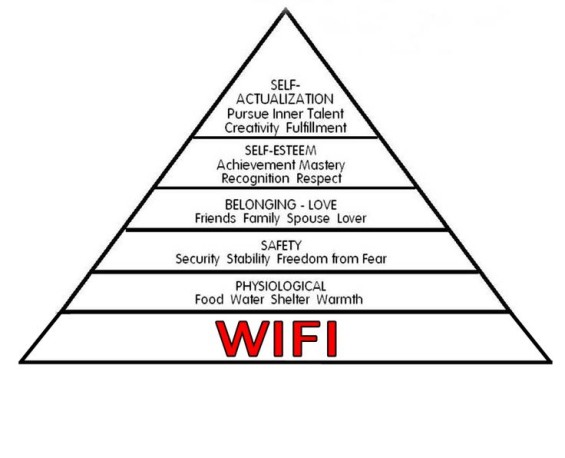Technology and Happiness – is Wifi essential to our well being?
Wikipedia
By David Laing
I’m sure that many of you are familiar with Maslow’s hierarchy of needs, the model which relates to motivation and satisfaction. The model suggests that as each successive level of need is attained, the next level is activated by our brains to motivate us to achieve it. The usual levels described in the model are physiological (eating, drinking, excretion, reproduction), safety (having shelter, regular meals, physical security, order), social (love, friendship, belonging, family, friends), esteem (achievement, self-respect, status, independence, prestige), self-actualisation (personal growth, reaching personal potential).
In a subsistence situation, where people struggle to feed themselves or even to have drinkable water will access to (any) technology be beneficial? While to some extent this will be context specific, it should be clear that if you don’t have a potable water supply, you are unlikely to care too much about access to a washing machine.
Recently, I’ve been reading about “margin”. It’s not sufficient to have just enough – there needs to be a little more (a margin), to give you confidence that what you have can’t be lost overnight. This holds true whether it’s having enough food (the base level of Maslow’s hierarchy), or having enough time to manage your work (top level).
Sometime before Christmas, I came across the following amended image of Maslow’s model:

Anon.
This version has been around for a while, and you’ve probably seen something similar on social media too. While this model is humorous in intent, it points to a technology reality. As technology becomes pervasive, and we expect to find it everywhere, society stops seeing it as a luxury (a want) and starts seeing it as a need. This happens with every new innovation, whether it be arable farming, domestic washing machines, or wi-fi.
The NZ Department of Statistics reports that in 2012, 93% of New Zealanders accessed the Internet at home. I can only assume that this figure is even closer to 100% by now. So while wifi is not at the bottom of the hierarchy, it probably fits into the safety level – it has essentially become a basic need for members of our society.
This does not imply that having wifi makes us happy – but perhaps that the absence of wifi makes many of us unhappy?
What do you think?
Information technology consultant David Laing is passionate about helping businesses to flourish by making the best use of their resources. He specialises in green IT. Find out more about David here.
loading...
loading...



Voices of our community